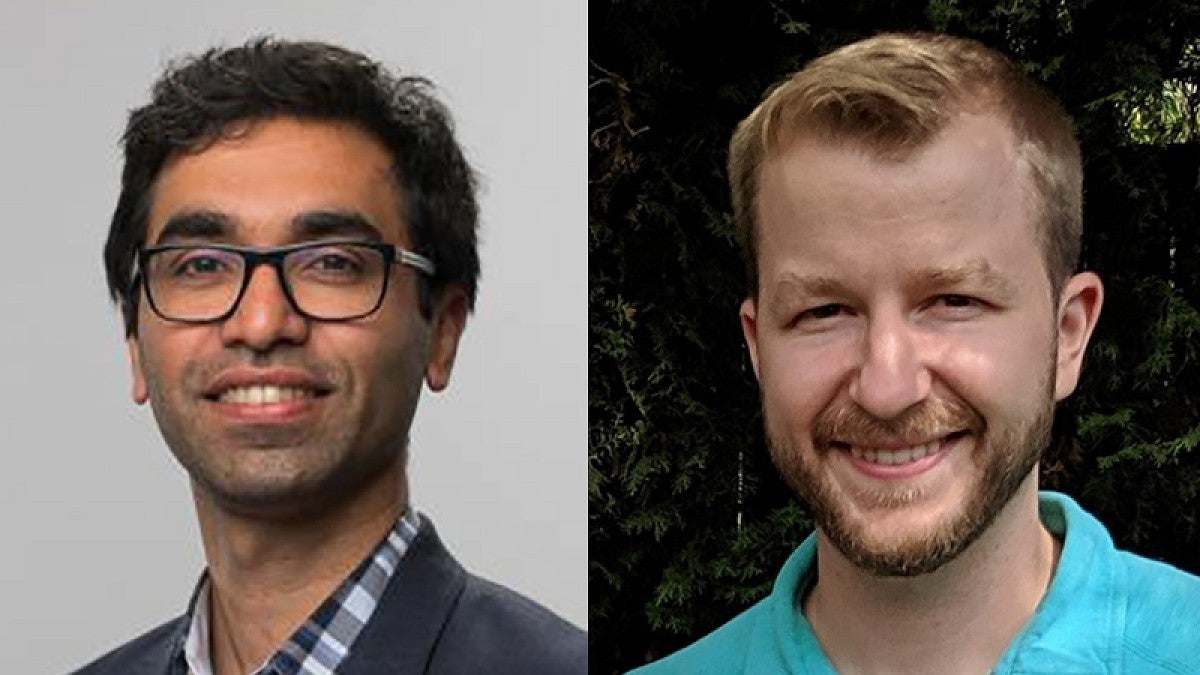Two assistant professors of physics at the University of Oregon have landed prized National Science Foundation research grants, funding their projects for the next four years.
Ben Farr and Jayson Paulose have been awarded $400,000 and $593,407, respectively, in grants from the NSF’s Faculty Early Career Development Program. The Career awards will fund Farr’s project, Education and Discovery in Astrophysics with Gravitational Waves, and Paulose’s project, Non-Hermitian Physics of Spacetime-periodic Soft Matter.
Farr has had an interest in physics since high school, but it was in college that he began to study black holes.
“My first experience digging into that was in undergrad in Rochester,” he said. “I talked with a professor that did classic generativity on pen and paper, working through Einstein's equations, solving things. I always thought that would be a fun direction to go in.”
After applying for the NSF Career grant for the third year in a row, Farr is excited to have finally gotten the opportunity to have more research partners in his lab. Combined with previous grant funding, the NSF Career grant allows him to have five graduate students, three undergraduate students and a Thurston High School teacher in his lab.
Now his work with the Laser Interferometer Gravitational-Wave Observatory focuses on surveying the population of black holes and understanding the physical mechanisms of black holes and neutron stars.
“We're trying to develop these statistical models to better understand black hole populations based on individual measurements,” Farr said. “It's a nice piece of the puzzle that we can finally bring into the mix.“
Supporting student researchers is important to advance a research program. Since securing adequate funding is always a concern, Paulose was elated to receive the award.
“Being able to guarantee funding for a long stretch felt like a load off my back,” Paulose said. “It also felt gratifying for my research ideas to be validated by the scientific community, having made it through the grant review process.”
Paulose’s research is on soft-matter physics and focuses on studying the behavior of natural, biological and artificial materials. The materials can include micromechanical resonators, miniature robots and even bacteria.
“Every aspect of modern technology, from the toughened glass of our phone touchscreens to the silicon chips enabling their enormous processing power, is built upon decades of fundamental research into the physics and chemistry of materials,” Paulose said.
This research aims to discover new material behavior phenomena and also has the potential to inspire a framework for new materials with practical uses.
Paulose’s Career project will develop fundamental physics models that predict the behavior of materials. He hopes that the discoveries made during this research process can be used by other research groups as building blocks for new materials.
The Career award also will help to fund materials science education outreach for K-12 students, nontraditional students, beginning graduate students and the general public. It also includes a paid summer research internship program for STEM students at Lane Community College.
“Undergraduate research experiences have strong positive effects on retention and success in undergraduate STEM fields, particularly for underrepresented groups in STEM,” Paulose said. “But they can be hard to come by for community college students. The internship program aims to improve access to undergraduate research among students who follow a nontraditional pathway to a four-year degree.”
– By Alyson Johnston and Natalie Myking, College of Arts and Sciences


